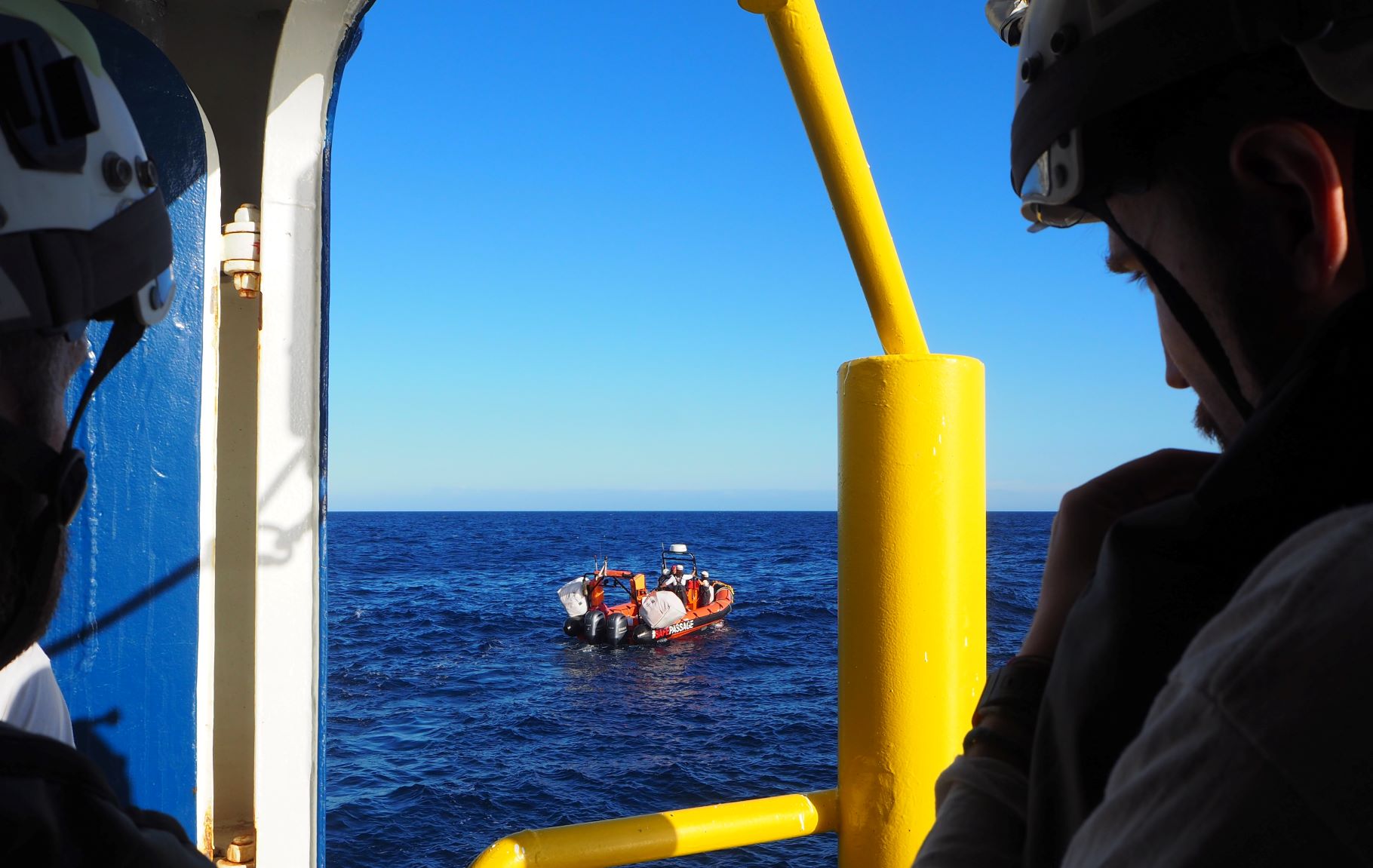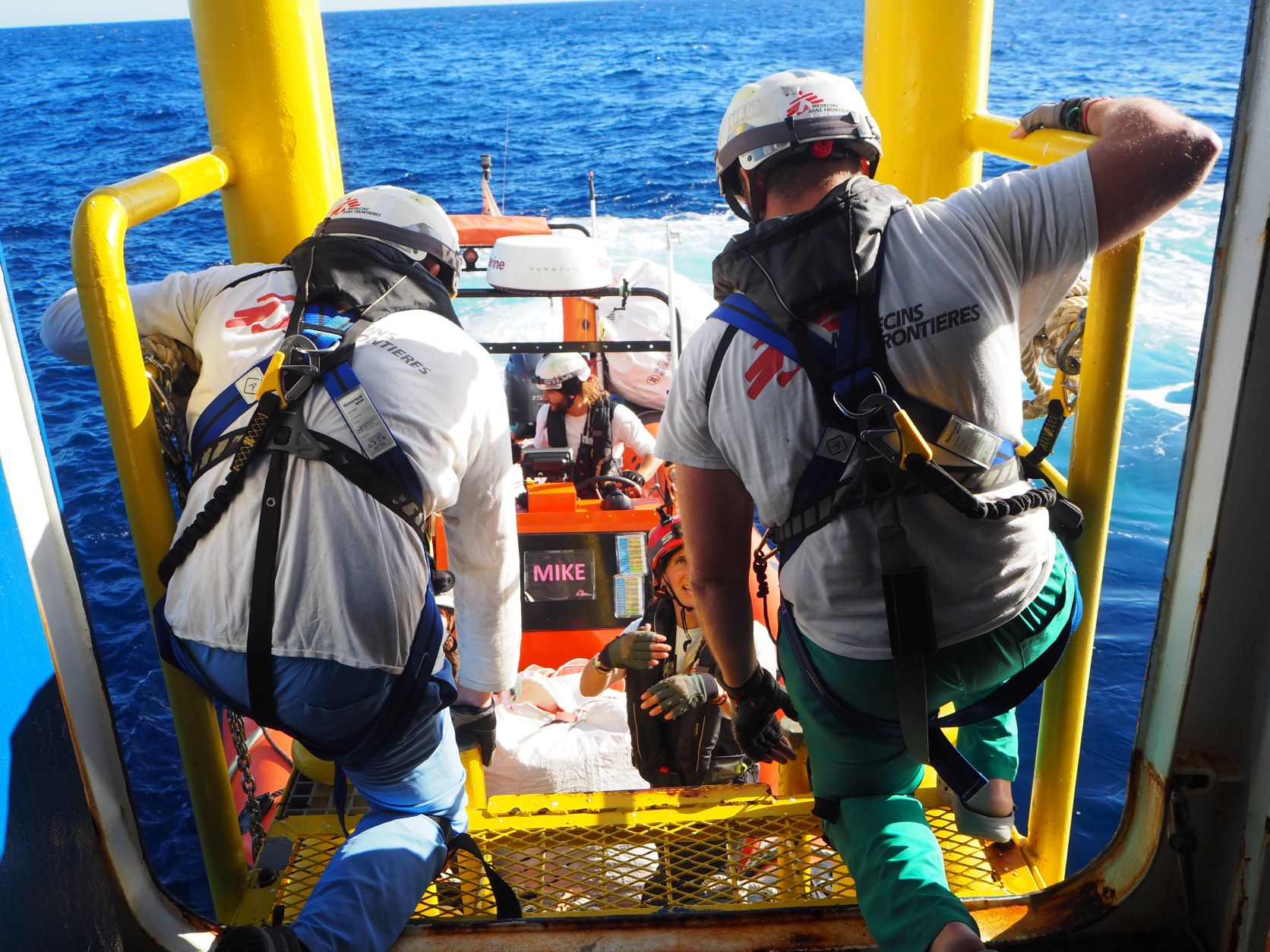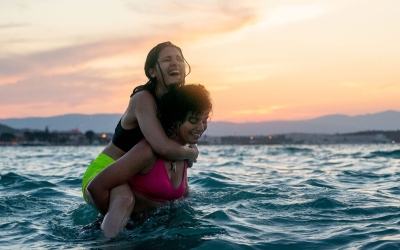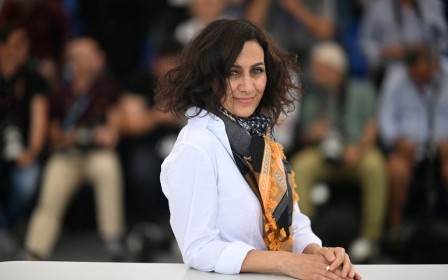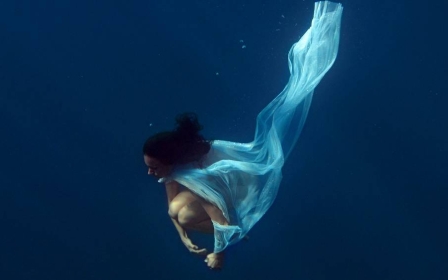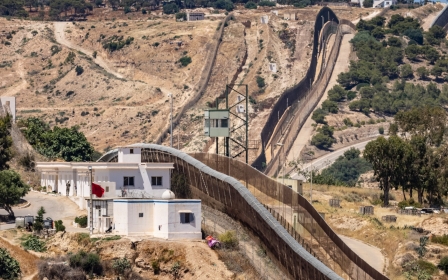Mediterranean NGO rescue ships defiantly return to sea after Italy stand-off
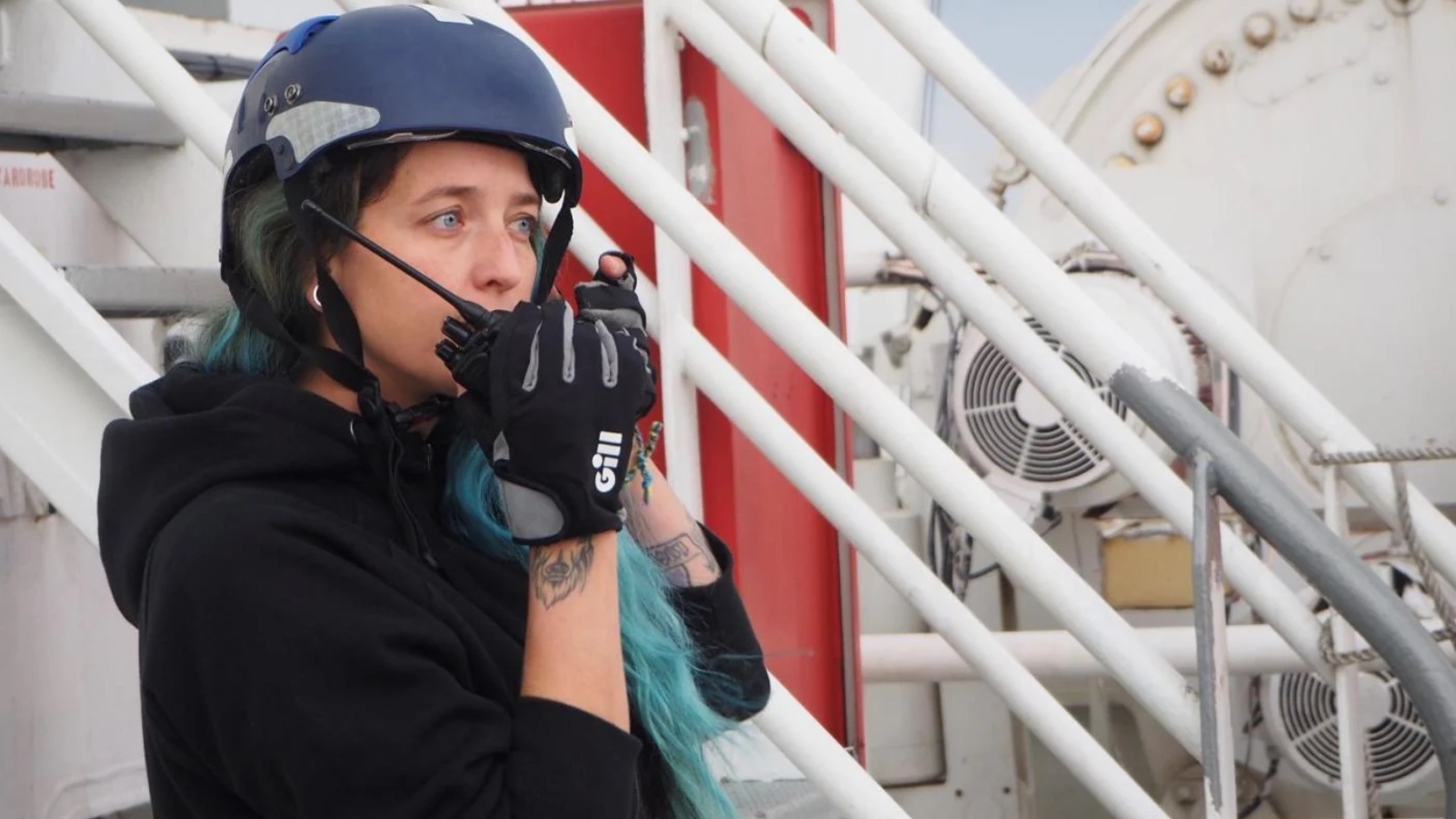
Onboard the Geo Barents - Boats rescuing refugees in the Mediterranean have returned to sea despite a longstanding dispute with the Italian government over the issue.
NGO workers with groups such as Doctors Without Borders (MSF) have warned that resistance from Italy has done nothing to stem the flow of refugees from North Africa - it has simply meant that crossings have become more deadly.
“It’s not that we are defiant for the sake of it, but because there is a humanitarian need that is not being met,” Anabel Montes, MSF’s search and rescue team leader on the Geo Barents boat, told Middle East Eye.
'There are boats leaving from the shores of North Africa with people risking - and losing - their lives, and EU states are still not providing efficient rescue options'
- Anabel Montes, MSF
“There are boats leaving from the shores of North Africa with people risking - and losing - their lives, and EU states are still not providing efficient rescue options, which is the main reason we are going out.”
The Italian stand-off has left a substantial area of the Mediterranean with even weaker rescue coverage than usual for almost a month, and the Geo Barents is likely to be one of only three NGO rescue ships operating throughout the winter.
New MEE newsletter: Jerusalem Dispatch
Sign up to get the latest insights and analysis on Israel-Palestine, alongside Turkey Unpacked and other MEE newsletters
MSF’s search and rescue (SAR) team have spent their first days at sea on the usual training exercises and drills that follow crew changes and precede each mission, going through a range of boat scenarios and rescue strategies, before heading deeper into the Mediterranean.
But an incoming storm is likely to prevent any NGO rescue vessels reaching the SAR zone before midweek, with fears this could leave any refugee boats that are already on the high seas at considerable risk.
The stand-off between Italy and the NGOs has seen over a thousand survivors stranded on four NGO rescue boats for over a week.
One vessel was accepted reluctantly by France, causing a diplomatic rift between Rome and Paris. Italy's new government, led by Giorgia Meloni, is dominated by the far-right and they have been determined to show a tough stance on migration, saying they will refuse the right for migrants to disembark on the country's shores.
"The reaction that France is having in the face of a request to take in 234 migrants - when Italy has taken in 90,000 this year alone - is totally incomprehensible," said Italian Interior Minister Matteo Piantedosi.
The remaining vessels were eventually disembarked in Italy, but not before desperation had prompted two Syrians to leap from the Geo Barents and swim ashore, where they were left on the harbourside all night, shivering inside survival blankets.
No patrols for weeks
The situation has left parts of the Mediterranean’s perilous winter waters un-patrolled by NGO vessels for more than three weeks.
The first NGO ship to return to the Mediterranean Sea on a search and rescue mission was the Geo Barents.
Pointing out that this wasn’t the first time the Italian authorities had refused to disembark survivors, Montes said EU member states’ only proposal was to try to block the activities of NGO rescue vessels without ensuring reasonable alternatives.
Since 2018, several ships’ captains have found themselves in Maltese and Italian courts accused of aiding illegal immigration and entering territorial waters illegally. Some vessels have been impounded, and most continue to be delayed by authorities nitpicking over paperwork, looking for any excuse to prevent them from returning to sea.
“With this media show about the NGO boats, the Italian government is distracting from the current numbers of arrivals in Lampedusa by blaming everything on the rescue ships,” a volunteer at Alarmphone - which helps identify refugee and migrant boats in distress - told MEE, speaking on condition of anonymity.
An independent organisation comprising a network of volunteers and activists who man a 24-hour phone line, Alarmphone has become a crucial alert tool, providing MSF with 54 percent of details for boat rescues undertaken by the Geo Barents this year.
“I think they are just holding the boats in a stand-off to show they have the same approach as [Deputy Prime Minister Matteo] Salvini in 2018, but legally they can’t actually do this,” the volunteer said.
Few alternatives
The area of the Mediterranean through which the majority of refugee boats sail is split into three rough geographical SAR zones - Italian, Maltese and Libyan, with each area deemed the responsibility of its country’s coastguard.
Although the Italian Coastguard continues to undertake rescue operations in its assigned SAR zone, including quietly bringing ashore more than 1,000 rescued refugees during the recent stand-off, Maltese and Libyan SAR areas are said to be poorly patrolled, with NGO rescue vessels stepping in to fill the gap.
“Malta does nothing. Boats in Maltese waters giving distress signals by any means possible receive absolutely no response from the Maltese authorities,” Montes said. On its last mission, all rescues undertaken by the Geo Barents were in Maltese waters.
The Libyan zone - formerly largely covered by EU-funded projects such as Operation Sophia - was established in 2018 when the Tripoli-based government self-declared it had taken control of the zone to the International Maritime Organization (IMO), the UN agency responsible for regulating shipping.
But EU-funded attempts to provide the Libyan coastguard with the necessary resources to prevent refugee boats reaching European waters have proven inadequate, and attracted fierce criticism from human rights groups as well as the NGO rescue ships.
“Libya is a massive country with no coherent, unified government in full control, and the EU only gives support to the Tripoli government, when there should be a coordinated central institution to manage the whole SAR zone, not only the western region,” Montes said.
“We don’t know what training the Libyan coastguard are receiving, but, for us, there are clear indications that they haven’t received good training.”
She said the Libyan Coastguard - which has become an umbrella term for several Libyan organisations - routinely failed to follow international maritime protocols, including basic radio communications. In the experience of staff aboard the Geo Barents, which has been operational since May 2021, these have vacillated between normal responses, no response at all, or someone shouting in Arabic.
Libyan patrols are described as arbitrary, with NGO vessels occasionally approached at high speed by Libyan Coastguard boats, including at night without lights. These sometimes circle vessels several times before speeding away, without having attempted to make any radio contact.
NGO boats are sometimes instructed to leave the Libyan SAR area and, at other times, given the details of vulnerable boats in need of rescue, all of which Montes described as “very strange behaviour”.
Scant rescue coverage
The central Mediterranean migration route remains one of the deadliest in the world.
Following quieter years during the Covid-19 pandemic, 93,241 refugees have arrived in Italy so far this year, some 15 percent of whom were brought to European shores by NGO vessels.
Migrants from Egypt (18,865) and Tunisia (17,295) have been the main nationalities, followed by Bangladeshis, Syrians and Afghans.
In winter months, people smugglers in Libya, and increasingly Tunisia, wait for suitable weather windows to put boats out to sea, which can lead to multiple vulnerable boats needing help at a time.
Rescue organisations (including several NGO-chartered planes that search for boats in distress and send co-ordinates to any nearby ships) say the smuggling industry is constantly evolving. The most recent trend has been packed wooden boats, usually old and in poor condition, rather than the large rubber dinghies that have long been the norm.
“Last month we saw an increase in the number of big wooden boats moving from Libya, which usually have between 400 and 700 people on board,” Montes said. “We are very worried because rescues from wooden boats take longer and are both more difficult and more dangerous.”
Another worrying new trend has been more departures from eastern Libya, for which the current rescue operations are ill-prepared.
“The NGO vessels all focus on the western Libya strip, from where most boats leave, but if this new trend from the eastern side continues it will require a change of strategy,” Montes said.
Middle East Eye delivers independent and unrivalled coverage and analysis of the Middle East, North Africa and beyond. To learn more about republishing this content and the associated fees, please fill out this form. More about MEE can be found here.


